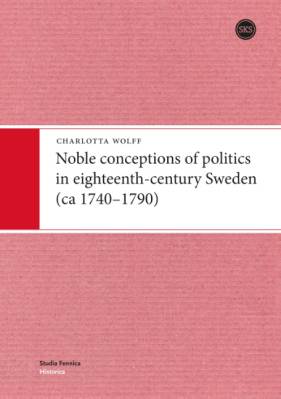Noble conceptions of politics in eighteenth-century Sweden (ca 1740-1790)
Wolff, CharlottaProduct information
| Title: | Noble conceptions of politics in eighteenth-century Sweden (ca 1740-1790) | ||
| Authors: | Wolff, Charlotta (Author) | ||
| Product number: | 9789522220929 | ||
| Product form: | Paperback | ||
| Availability: | Delivery in 7-14 workdays | ||
| Price per piece: | 29,00 € (25,55 € vat 0 %) | ||
|
|||
| Publ. product code: | 1379301 |
| Publisher: | Suomalaisen Kirjallisuuden Seura |
| Series: | Studia Fennica Historica 15 |
| Edition: | 1. edition, 2008 |
| Language: | English |
| Pages: | 136 |
| Product family: | History Studia Fennica Historica Books in English |
| Finnish library classification: | 93.1 Ruotsin historia |
| YSO - General Finnish ontology: | aateli, yläluokka, poliittinen eliitti, identiteetti, ihanteet, valtiomuodot, tasavaltalaisuus, vapaus, kansalaisuus, politiikka, käsitteet, kielenkäyttö, vapauden aika, kustavilainen aika, poliittinen historia, historia |
| Key words: | Identity, Political Elite, ideals, nobility, upper class |
Noble conceptions of politics in eighteenth-century Sweden (ca 1740-1790) is a study of how the Swedish nobility articulated its political ideals, self-images and loyalties during the Age of Liberty and under the rule of Gustav III. This book takes a close look at the aristocracy's understanding of a free constitution and at the nobility's complex relationship with the monarchy. Central themes are the old notion of mixed government, classical republican conceptions of liberty and patriotism, as well as noble thoughts on the rights and duties of the citizen, including the right to rebellion against an unrighteous ruler.
The study is a conceptual analysis of public and private political statements made by members of the nobility, such as Diet speeches and personal correspondence. The book contributes to the large body of research on estate-based identities and the transformation of political language in the second half of the eighteenth century by connecting Swedish political ideals and concepts to their European context.
The study is a conceptual analysis of public and private political statements made by members of the nobility, such as Diet speeches and personal correspondence. The book contributes to the large body of research on estate-based identities and the transformation of political language in the second half of the eighteenth century by connecting Swedish political ideals and concepts to their European context.





